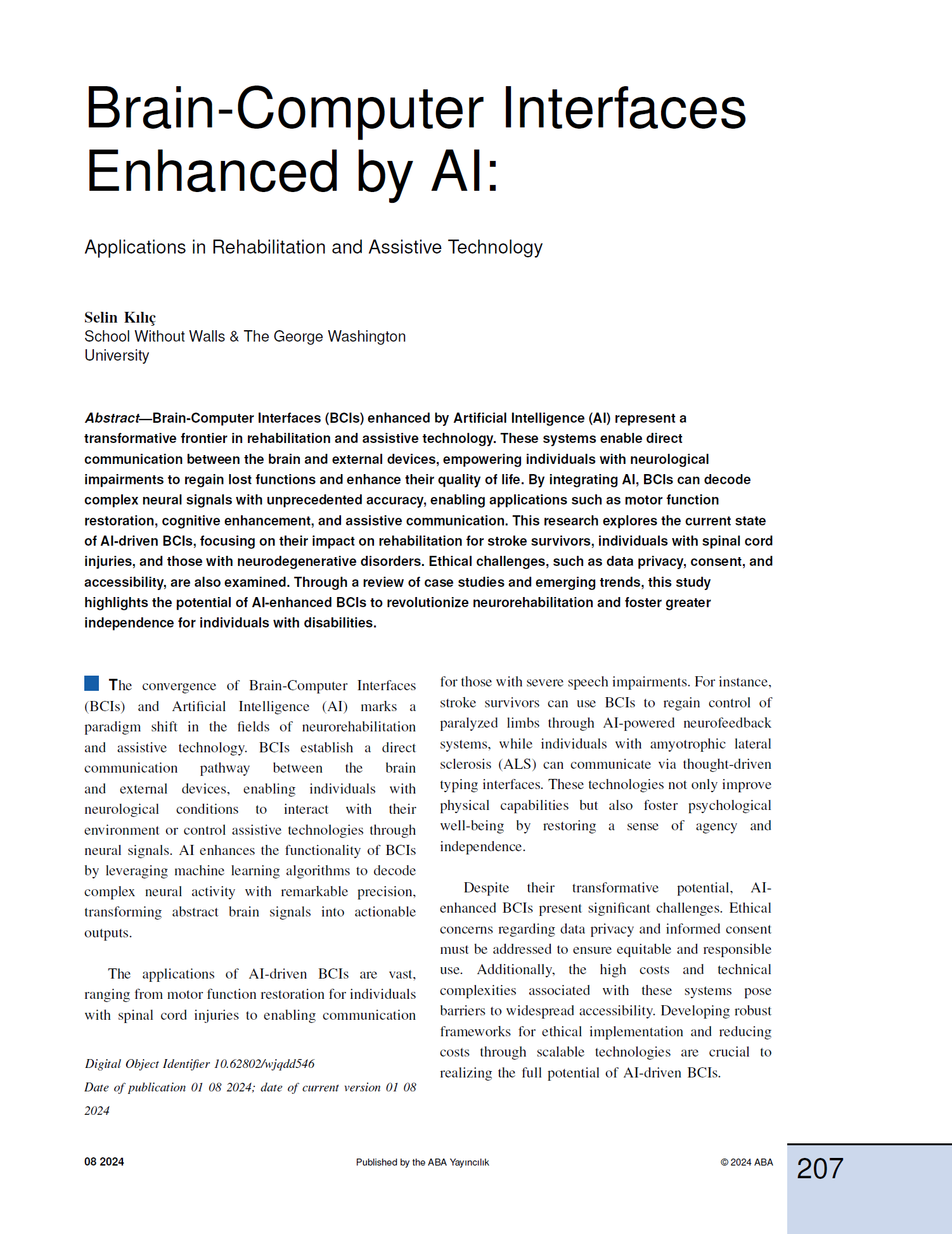Brain-Computer Interfaces Enhanced by AI: Applications in Rehabilitation and Assistive Technology
DOI:
https://doi.org/10.62802/m89avz38Keywords:
Brain-Computer Interface, Artificial Intelligence, Rehabilitation, Assistive Technology, Neural Decoding, Neuroplasticity, Ethical ConsiderationsAbstract
Brain-Computer Interfaces (BCIs) enhanced by Artificial Intelligence (AI) represent a transformative frontier in rehabilitation and assistive technology. These systems enable direct communication between the brain and external devices, empowering individuals with neurological impairments to regain lost functions and enhance their quality of life. By integrating AI, BCIs can decode complex neural signals with unprecedented accuracy, enabling applications such as motor function restoration, cognitive enhancement, and assistive communication. This research explores the current state of AI-driven BCIs, focusing on their impact on rehabilitation for stroke survivors, individuals with spinal cord injuries, and those with neurodegenerative disorders. Ethical challenges, such as data privacy, consent, and accessibility, are also examined. Through a review of case studies and emerging trends, this study highlights the potential of AI-enhanced BCIs to revolutionize neurorehabilitation and foster greater independence for individuals with disabilities.
References
Awuah, W. A., Ahluwalia, A., Darko, K., Sanker, V., Tan, J. K., Pearl, T. O., ... & Atallah, O. (2024). Bridging minds and machines: the recent advances of brain-computer interfaces in neurological and neurosurgical applications. World Neurosurgery.
Elashmawi, W. H., Ayman, A., Antoun, M., Mohamed, H., Mohamed, S. E., Amr, H., ... & Ali, A. (2024). A Comprehensive Review on Brain–Computer Interface (BCI)-Based Machine and Deep Learning Algorithms for Stroke Rehabilitation. Applied Sciences, 14(14), 6347.
Eldawlatly, S. (2024). On the role of generative artificial intelligence in the development of brain-computer interfaces. BMC Biomedical Engineering, 6(1), 4.
Goyal, S., & Laddi, A. (2024). Machine learning for Developing neurorehabilitation-aided assistive devices. In Computational Intelligence and Deep Learning Methods for Neuro-rehabilitation Applications (pp. 121-148). Academic Press.
Gupta, R. (2024). AI-based technologies, challenges, and solutions for neurorehabilitation: A systematic mapping. In Computational Intelligence and Deep Learning Methods for Neuro-rehabilitation Applications (pp. 1-25). Academic Press.
Islam, M. M., Vashishat, A., & Kumar, M. (2024). Advancements Beyond Limb Loss: Exploring the Intersection of AI and BCI in Prosthetic Evaluation. Current Pharmaceutical Design, 30(35), 2749-2752.
Jaber, W., Jaber, H. A., Jaber, R., & Saleh, Z. (2024). The convergence of AI and BCIs: A new era of brain-machine interfaces. Artificial Intelligence in the Age of Nanotechnology, 98-113.
Khorev, V., Kurkin, S., Badarin, A., Antipov, V., Pitsik, E., Andreev, A., ... & Hramov, A. (2024). Review on the use of brain computer interface rehabilitation methods for treating mental and neurological conditions. Journal of Integrative Neuroscience, 23(7), 125.
Ramadan, R. A., & Altamimi, A. B. (2024). Unraveling the potential of brain-computer interface technology in medical diagnostics and rehabilitation: A comprehensive literature review. Health and Technology, 14(2), 263-276.
Zhang, H., Jiao, L., Yang, S., Li, H., Jiang, X., Feng, J., ... & Wei, B. (2024). Brain–computer interfaces: the innovative key to unlocking neurological conditions. International Journal of Surgery, 110(9), 5745-5762.









